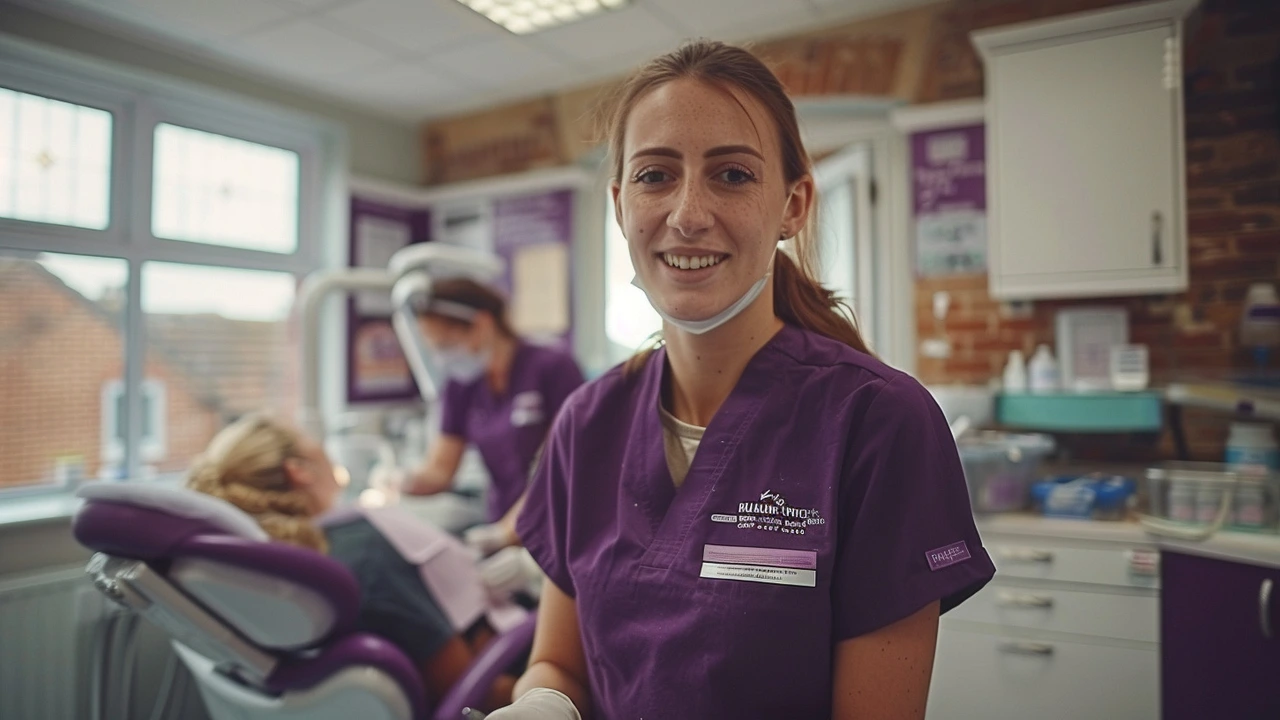
What is Tooth Sandblasting?
Tooth sandblasting, scientifically known as air polishing, is a modern dental cleaning technique where a mixture of air, water, and a fine abrasive powder is used to blast away plaque, stains, and other debris from the teeth. The method is highly effective for removing surface stains without damaging the tooth's enamel and is especially beneficial for patients who experience heavy staining from habits like smoking or drinking coffee. The procedure is not only known for its efficiency in cleaning, but also for the reduced time it requires compared to traditional scaling.
The precision and minimal discomfort associated with tooth sandblasting make it a preferred choice for both dentists and patients looking to achieve a brighter smile. It often forms part of a more extensive dental cleanup but can also be requested as a standalone treatment to enhance aesthetic appeal and maintain oral hygiene.
Benefits of Tooth Sandblasting
Beyond just cosmetic enhancements, tooth sandblasting offers several health benefits. Firstly, it can significantly reduce the risk of gum disease by removing plaque buildup, which is a primary cause of gingivitis and periodontitis. This deep cleaning method helps reach tricky areas that normal brushing or even scaling might miss.
Moreover, patients with sensitive gums find tooth sandblasting more comfortable as it does not involve direct contact with the gums, unlike scaling which sometimes leads to bleeding or soreness. The ability to maintain better oral hygiene with less discomfort promotes regular dental visits and better overall dental health.
Determinants of Tooth Sandblasting Cost
The cost of tooth sandblasting can vary widely depending on several factors. Primary among these is geographical location. Urban centers with higher living costs typically also see higher charges for dental services. The expertise and reputation of the dental clinic also play significant roles in determining the price. More reputed clinics with experienced dental professionals may charge more due to their proven expertise and advanced technology.
Another factor influencing cost is the extent of cleaning needed. For instance, someone with severe staining from years of smoking will likely require a more intensive, and hence costlier, treatment compared to someone needing a routine clean-up. Additional treatments, such as fluoride application or further cosmetic procedures like whitening, can also affect the final bill.
Average Cost and Payment Options
On average, tooth sandblasting procedures can range from $100 to $250 per session. However, this is subject to the factors mentioned above. Some dental insurance plans may cover part of the cost of tooth sandblasting, especially if it is recommended for health reasons by a dentist. It's important for patients to discuss these details with their dental care provider and insurance company to understand the coverage extents and out-of-pocket costs.
To make dental care more accessible, many clinics offer payment plans or partnerships with third-party financing companies. These options allow for more manageable payments, making essential dental treatments available without immediate full payment. It’s advisable for patients to explore such options, especially if undergoing multiple treatments.
In conclusion, while the cost of tooth sandblasting can vary, understanding these driving factors can help patients make informed decisions and possibly find financial assistance, ensuring that dental health does not become a burden.
Write a comment
More Articles

Natural Mouthwash Alternatives: Enhance Oral Health Without Chemicals
Exploring alternatives to commercial mouthwash can be beneficial for those seeking a more natural approach to oral hygiene. This article discusses various natural substitutes, their benefits, and how to use them effectively. Whether due to sensitivities, personal preference, or ecological concerns, these alternatives offer effective solutions for maintaining oral health. From herbal rinses to oil pulling, learn how to keep your mouth fresh and healthy without the harsh chemicals found in traditional mouthwashes.

How does post-operative care proceed after dental curettage?
Hi there, I just had the opportunity to go through an enlightening procedure called dental curettage. In this post, I'll share with you what I learnt about the post-operative care following this dental surgery. Good post-operative care is crucial for quick recovery and optimal results. From managing pain and swelling to adapting your diet to promote healing, I've got you covered on what steps to take. I hope this provides you some insights if you are about to undergo a similar procedure.

What works for teeth whitening?
Hey there, I'm here to help you on your journey to a sparkling smile with this post on what works for teeth whitening. Let's delve into the different methods from natural remedies to clinical treatments, all in the name of oral hygiene. This post is ideal for anyone interested in dental care and keen on maintaining a stunning smile. Trust me, your dazzling white teeth are just a few tips away!



